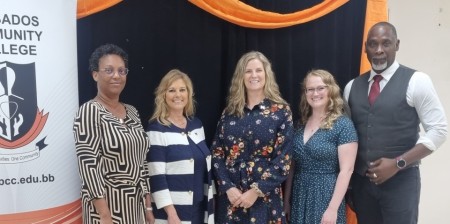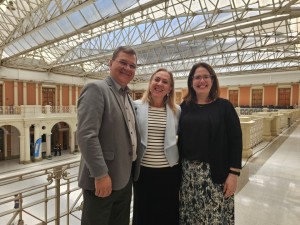Global Nursing
The University of Michigan School of Nursing brings nursing students and scholars together from across the globe, fostering a vibrant community of shared education, research, and practice. Discover the exciting initiatives we champion locally and worldwide through our Office of Global Affairs. Meet our team and see how we can make a difference.
Mission
To support and expand a diverse community of global health leaders to advance Health for ALL through collaborative research, education, and practice.
Vision
To advance the impact of nursing and midwifery locally, nationally, and globally.
Core Values
- Leadership and collaboration
- Excellence and innovation
- Respect and empowerment
- Service and compassion
Meet the Team
- Jeanne-Marie R. Stacciarini, PhD, RN, FAAN, Professor and Associate Dean for Global Affairs and Director of the WHO Collaborating Centre
- Megan Eagle, RN MS MPH FNP-BC Clinical Instructor and Deputy Director of the WHO Collaborating Centre
- Michelle Munro-Kramer, Ph.D., CNM, FNP-BC, Associate Professor and Director of Global Programs
- Jennifer Chapin-Smith, OGA Administrative Assistant
UMSN celebrates 27 years as a Pan-American Health Organization/World Health Organization Collaborating Centre.
University of Michigan School of Nursing is one of only 44 schools worldwide to hold a PAHO/WHO collaborating centre designation . This makes UMSN part of an international network working towards health of all.

Initiatives
- Dr. Jeanne-Marie Stacciarini represented the University of Michigan School of Nursing at the XVIII Coloquio Panamericano de Investigación en Enfermería - Chile 2024 and was present during the Annual PAHO meeting.
- Dr. Sue Anne Bell represented the Alliance of Nurses for Healthy Environment at the United Nations’ COP29 conference in Azerbaijan.
- Dr. Michelle Munro-Kramer recently returned from presenting at the 25th Nursing Network on Violence Against Women Conference in Phuket, Thailand. There she spoke about preventing gender-based violence in sub-Saharan African universities. She seeks to leverage nurses’ creativity to addressing partner violence, sexual violence, and human trafficking with a focus on field work in Ethiopia, Ghana, Liberia and Zambia.
2025 Global Collaborative Series
UMSN Office of Global Affairs is partnering with the Vanderbilt School of Nursing and the Yale School of Nursing to host a monthly online speaker series Aligning Advanced Practice Nursing with Global Sustainable Development Goals. These presentations take place at 1 pm Eastern Time on the fourth Wednesday of every month. Register here.






